Upstream Thinking 2
Following the success of Upstream Thinking 1 (2010-2015), Westcountry Rivers Trust continue to work with South West Water (SWW) to deliver the second phase of the Upstream Thinking (UST) initiative, running from 2015 to 2020.
Read SWW’s final review of UST2 – Upstream Thinking 2015-2020
Read the results of the 2019 farmer survey on Our News.
In the Westcountry, the majority of our water supply is sourced from our rivers. Often SWW must rely on expensive and resource intensive treatments processes to ensure that we have a clean supply of water available for our homes and businesses. But UST aims to reduce the need for such intensive treatment – we aim to reduce the issues relating to water quality at their source.
Number of farms visited
Number of farm plans
Hectares engaged farms
£ of planned investment (from SWW & matched by farmers own contributions)
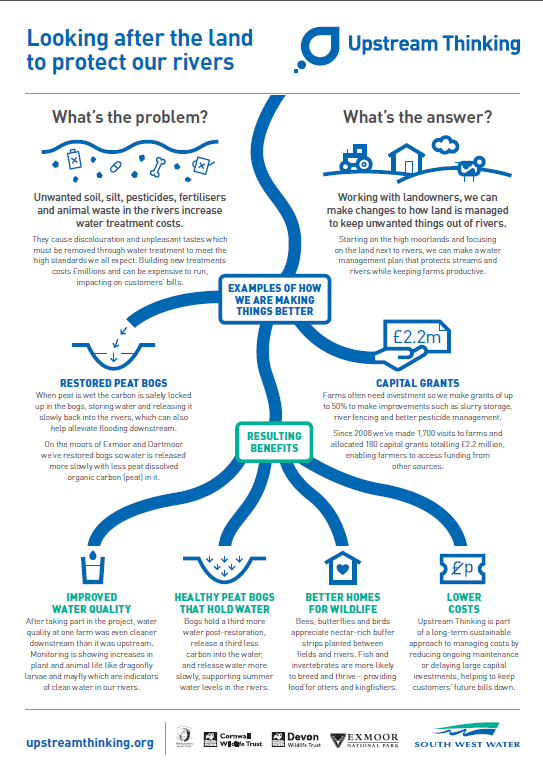
Issues relating to water quality in Westcountry rivers usually derive from thousands of small incidents across a wide area, which may not individually breach water standards but which collectively cause polluted rivers.
By reducing these inputs into our rivers, we will not only improve raw water quality entering the treatment works, there will also be additional benefits relating to the general health of the river and its ecology and to agricultural productivity in the region.
Over the current five-year period, we will be working with landowners across five strategically important drinking water supply river catchments in the Westcountry: the Fowey, Tamar, Exe, Dart and Otter catchments.
Along with our other partners – South West Water, Devon Wildlife Trust, Cornwall Wildlife Trust and Exmoor National Park Authority – we will find ways to reduce and mitigate some of the pressures.
The philosophy behind ‘Upstream Thinking’ has long been ingrained in the Westcountry Rivers Trust. The first phase of UST was born from earlier trials with South West Water and the Tubney Project we had previously been conducting in the Upper Tamar Lakes; these and other projects providing land management advice all revolved around the protection of water quality.
‘Provider is Paid’
The ‘Upstream Thinking’ Initiative arose from some ‘lateral thinking’ on behalf of the project team – we all conceded that we ask a lot from landowners in our rural catchments. We ask them to produce food, which they can get paid for, but we also ask them to deliver clean water, protect biodiversity, contribute to flood defence, manage landscape character and accommodate recreation and access, most of which they cannot get paid for. Unsurprisingly they struggle to deliver all of these services to the level required by society.
Instead of resorting to prosecuting landowners for not delivering all of the above services under the traditional ‘polluter pays principle,’ the group felt that landowners should be financially encouraged and rewarded for their positive actions in what could be described as a new ‘provider is paid principle’.
‘Perception of Value’
The funding mechanism for this approach is the most innovative element: SWW recognised that it is cheaper to help farmers invest in improvements that deliver cleaner raw water (water in rivers and streams) than it is to pay for the ongoing expensive filtration equipment required to treat polluted water after it is abstracted from the river for drinking.
Accordingly, SWW have proven that water consumers would be better served by spending a small proportion of the money raised from the water bill on catchment restoration in the short term rather than a larger proportion, on water filtration in the long term. In the longer term water consumers (all of us) will benefit financially.
The icing on the cake, however, are the spin-off benefits resulting from this ‘upstream approach’. The environment, which is why most of us live in the Westcountry, will be protected and restored on an unprecedented scale. Conservation and biodiversity will become part of the living working landscape rather the preserve of nature reserves. Farmers will be fairly paid to deliver all sorts of essential services for society in addition to food.
How Upstream Thinking Works
Catchment scale: The Upstream Thinking project considers land management and water quality at a catchment scale. By combining the experience and knowledge of our UST farm advisors in their catchments with our catchment-scale monitoring, mapping and modelling, we are able to gain a broad understanding of our UST areas.
Focus areas: Our knowledge of the catchment can then be used to target focus areas where interventions are most likely to lead to significant improvements in the water quality of our rivers, considering both the scale of risks across the catchment and the water quality driver priorities.
Farm engagement & visit: Our experienced UST farm advisors have a close relationship with farmers in their catchment, developed through farm engagement and visits, events and publicity over a number of years. Our advisors work together with farmers, holding full discussions to understand the farm business, its plans and any opportunities for land management practices to become more ‘water sensitive’.
Farm scale: To gain a more detailed understanding, more detailed monitoring, mapping and modelling is carried out in focus areas at the subcatchment- and farm-scale.
Farm plan: Following the farm visit, engaged farmers receive a farm plan, which is tailored to reflect discussions, advice and costed opportunities & savings.
Active management: The farm plans highlight opportunities for farmers to adopt active management practices, enabling them to improve their land management and soil health and make changes to farm infrastructure that will reduce nutrient or bacterial losses to the river and, in many cases, improve the productivity and efficiency of the farm business.
Capital investment: Where appropriate, engaged farmers may be considered for capital investment through grant funded interventions or help to leverage alternative funding, where available.
Focus on Pesticides
The first round of UST aimed to improve water quality through nutrient and sediment reduction. This second round will still be working on those same principles but with a particular focus on reducing pesticide pollution. Drinking water is subject to stringent European guidelines for pesticides and this project will be working to reduce the risks associated with agricultural pesticide use both on the land and through handling operations before they reach our watercourses or the water treatment works. This will have an improved benefit to river ecology as well as saving money for practitioners through improved practices. As with the initial round of Upstream Thinking, a collaborative approach will be undertaken which sees stakeholders informed, advised and assisted on how they can play their part in the protection of river catchments as part of an integrated approach to good land management. We are also continuing to build relationships with contractors and agronomists as an integral part of our efforts to reduce pesticide pollution.
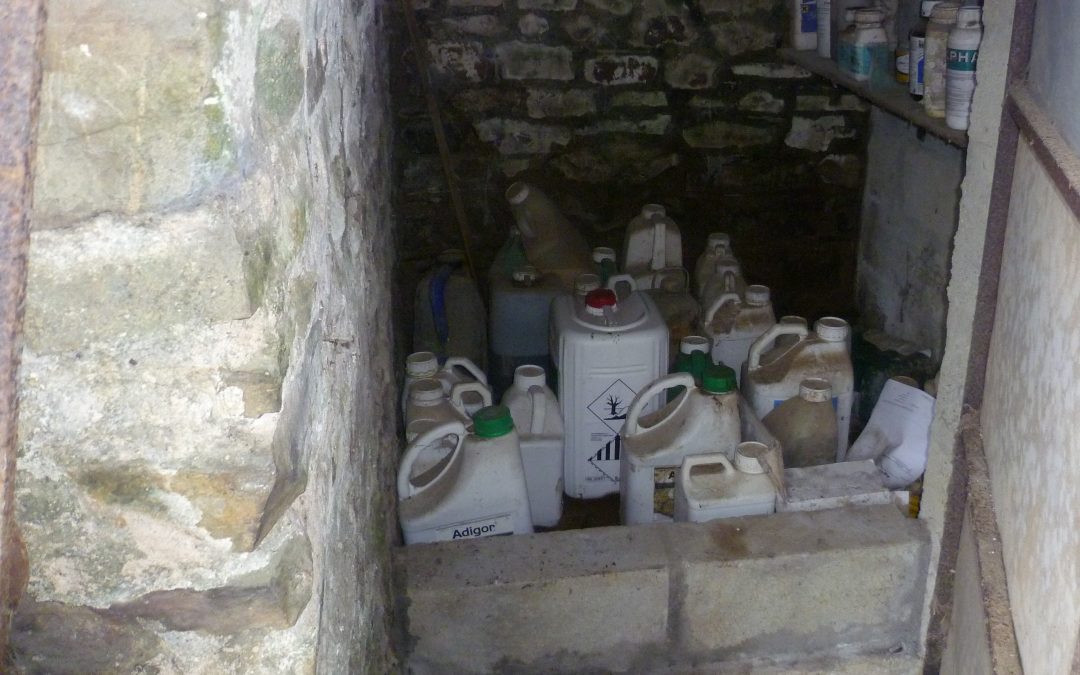
Pesticide Amnesty
Working with a local waste contractor, we have run a pesticide amnesty across our catchments from 2016-2019, offering free disposal for any historic, banned or obsolete products. We have safely collected and incinerated more than 4.8 tonnes of assorted pesticides in total as of August 2019. Given that one gram of active ingredient can be detected 35km downstream (in a 1 x 0.3m stream), this demonstrates the significant reduction in risk achieved by the amnesty.
Chemcatchers
Chemcatchers were deployed by South West Water’s water quality scientists and the UST partners across 4 target areas. This new passive sampling tool was developed with Portsmouth University to provide an alternative method of monitoring that adsorbs pesticides from the river to assess concentrations over 6 weeks. Early results confirm occurrence of certain high-risk pesticides; we are now discussing with farmers how losses from land ultimately reach watercourses – and how we can achieve best practice to avoid this.
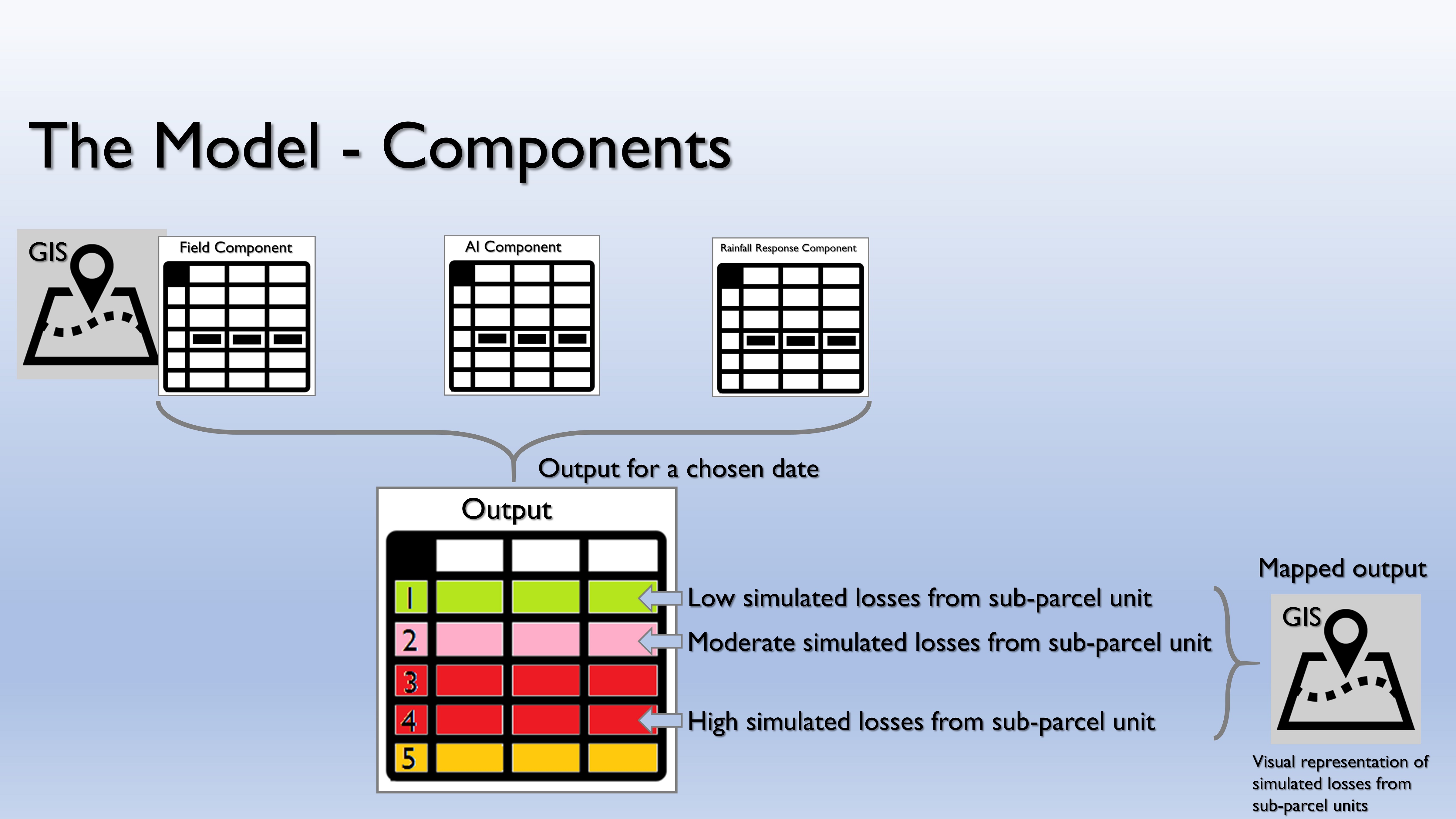
Pesticide Model
We are currently in the process of developing a spatially orientated software framework to simulate the frequency of pesticide concentration spikes in rivers at the point of raw water abstraction. With the use of the most up to date and finest resolution data possible, farm holding, and field scale processes will be modelled and will take into account the processes and changes within our target sub-catchments.
The intention is to use this information to identify critical source areas for pesticides within the catchment and for the model to be used by South West Water and ourselves to inform land and operations management. The model will be able to pin-point at field-scale where in-catchment a pesticide detection is most likely resulting from.
Pesticide Workshops
Pesticide workshops have been held in both the Dart and Exe catchments to date. In the Dart catchment, we organised the ‘Water-Aware Grassland Weed Control’ workshop in October 2016 to highlight the ways in which farmers could reduce the risks of grassland sprays reaching watercourses. Partners in the project are Westcountry Rivers Trust and Devon Wildlife Trust, the Wildlife Trust brought along their LOGIC Weedwiper to demonstrate, and to aid discussion on the control of rushes and other weeds, such as docks. The technical content of the day was delivered by Neil McLean and Simon Rollinson of AGRII.
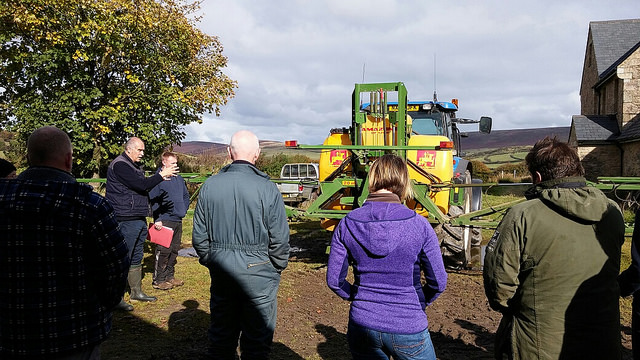
Case Studies
Down on the farm
Otter Catchment Fertiliser Trial
Our Otter Catchment Advisor, Yog Watkins, has undertaken a trial comparing controlled release fertiliser against the usual product with forage analysis and regular monitoring of growth rates. Data showed an overall cost saving of 20% for controlled release fertiliser despite the higher unit cost, but with less than half the nitrogen per hectare required to produce virtually identical growth patterns. These promising results show how farmers can protect the environment while saving money.
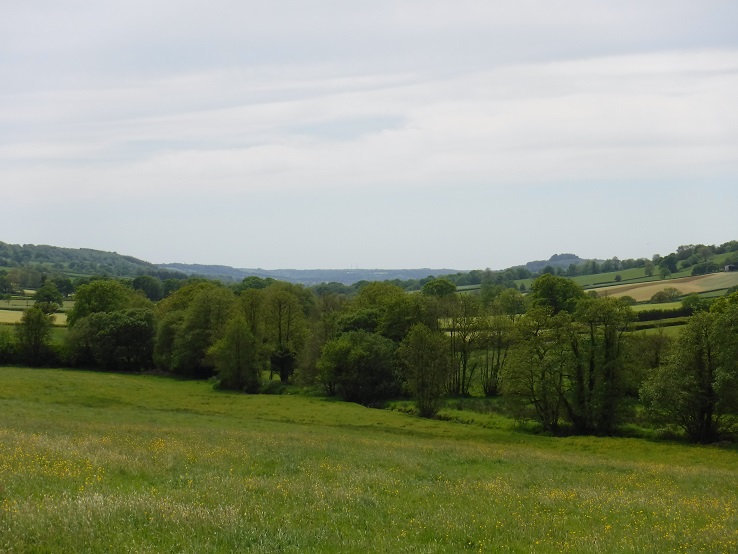
A new approach on the Fowey
This film from South West Water, the Westcountry Rivers Trust and the University of East Anglia, shows how farmers, water company customers and the environment benefit from farm improvements to cut pollution in a Cornish river, the River Fowey.
The River Fowey supplies around 70% of Cornwall’s water.
South West Water has increasingly invested in their water treatment works to treat water to a high standard for drinking.
Farming can contribute to the deterioration of river water through the run-off of sediment, nutrients, pesticides and animal manure from the land, making the clean-up even more costly.
As part of their ‘Upstream Thinking’ programme http://www.upstreamthinking.org, South West Water put forward £360,000 to be paid directly to farmers for improvements such as fencing, covering feeding sheds and improving slurry stores.
The University of East Anglia and the Westcountry Rivers Trust devised a competitive auction, to get best value for money in terms of environmental improvement per pound of investment.
18 farmers were funded under the scheme and one of the farmers is featured in the film.
Credits:
The film was sponsored and produced by Living With Environmental Change http://www.lwec.org.uk
The research was supported by Defra’s Payments for Ecosystem Services Pilot Research Fund http://ecosystemsknowledge.net/resour… and by the NERC Impact scheme http://www.nerc.ac.uk/funding/availab…,managed by the Knowledge Transfer Network https://www.innovateuk.org/-/knowledg…
Acid Remediation Trial
The Westcountry Rivers Trust is working with the University of Plymouth to trial a new approach to balancing the pH of the upper River Dart. Together, the research team hopes that the study will find a practical way to create a healthier environment for salmon and other aquatic life.
Salmon in the West Dart are classified as being ‘at risk’ and one of the causes of their decline is believed to be the harmful effects of historic acid rain. By introducing mesh bags containing local calcium carbonate to the river, the team aims to reduce the acidity of the river, returning it to its natural pH levels.
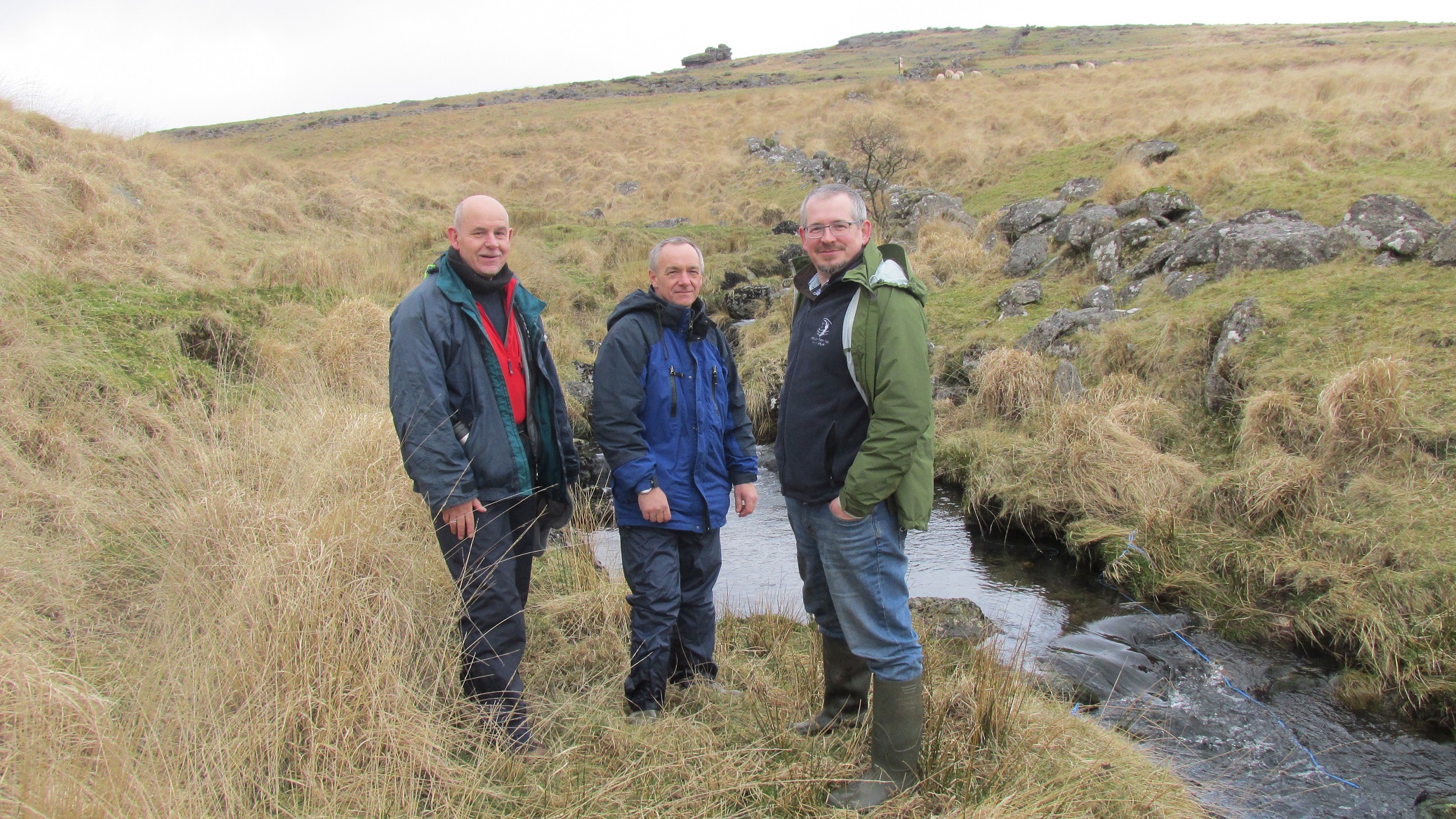
Drone Surveys
The Westcountry Rivers Trust has been working with the University of Exeter to trial rapid, low-cost remote sensing technologies. A specially developed smartphone app offers a affordable way for environmental charities, such as WRT, to benefit from the use of a remote controlled drone and fine-grained Structure-from-Motion (SfM) photogrammetric modelling to build up high resolution, 3D imagery of the landscape.
We have been assessing the potential of this approach for targeting catchment management interventions designed to mitigate sources and pathways of diffuse agricultural pollution mobilisation at a farm/field scale.
Biodiversity
Alongside the improvements to water quality in our rivers, Upstream Thinking has additional benefits for wildlife, both within our rivers and across the river catchments. In this round of Upstream Thinking, we are working to quantify and qualify the extent of this improved biodiversity, particularly focusing on protected species and designated areas. This associated work will run alongside the farm advice, utilising a broad range of sites and examples locally to illustrate benefits from actions on the ground. More details will emerge and contribute to project understanding as part of the overall project review, which also helps to inform and shape future potential work to maximise benefits to society.
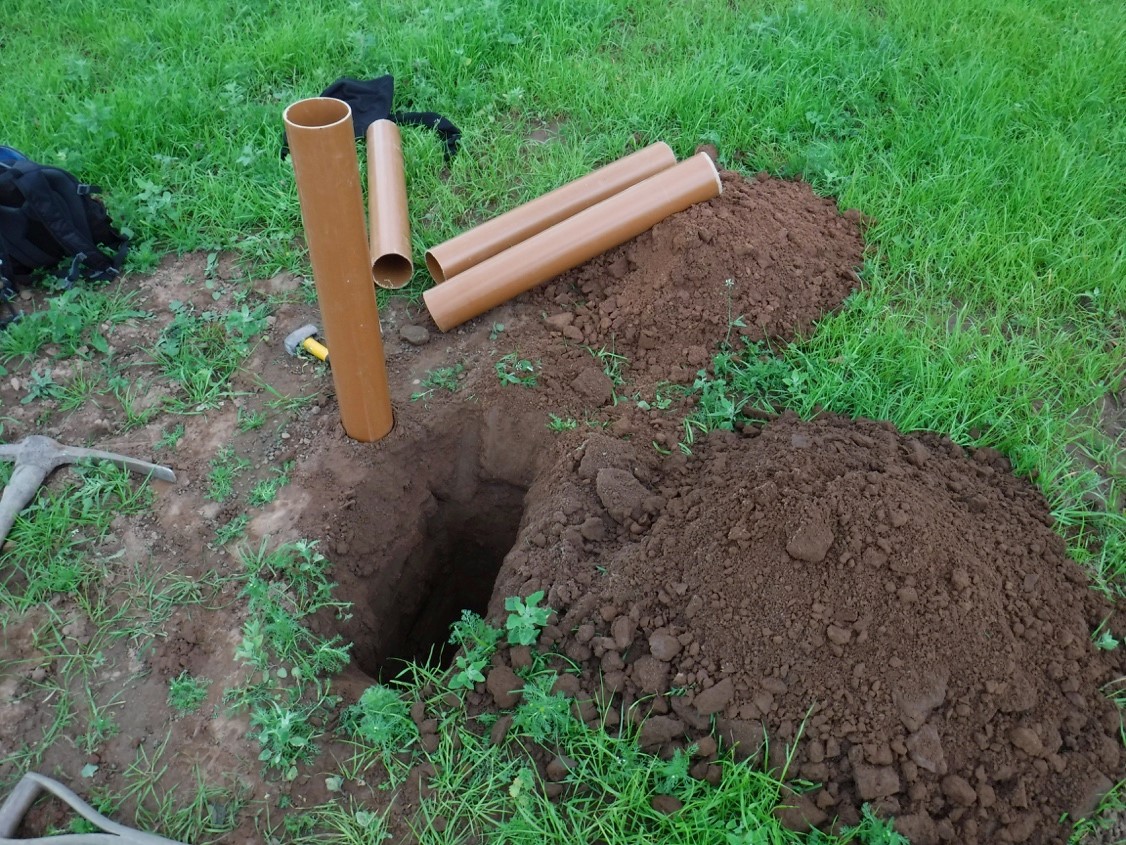
ZEBATM Trial
Working to alleviate pressures on the land and aquifer, our Otter Catchment Advisor Yog Watkins has been using a soil conditioning product (ZEBATM) in a field-scale demonstration plot and soil hydrology test, comparing its ability to increase the soil’s capacity to absorb and retain water. ZEBATM is a biodegradable starch polymer which can absorb and retain water over 400 times its original volume. This product has the potential to reduce leaching of soluble nutrients by keeping them close to the plants’ roots rather than allowing them to pass through the soil profile before they can be utilised by the growing plant. ZEBATM can also have a direct impact on the soils structure, fracturing the soil surface as it swells and also reducing soil consolidation. Soil consolidation (slumping) can lead to reduced drainage and further problems for the plants.
By carrying out an isolated soil profile and field scale demonstration, including the use of our drone for aerial surveys, we hope to ascertain its effectiveness and viability at reducing nitrate losses. The trial was recently nominated for the Institute of Water’s “Innovation Award.”

Catchment Investigations
Between 2011 and 2013, the Westcountry Rivers Trust carried out catchment investigations for 17 catchments across the region, including detailed pollution risk assessment and source apportionment evidence and targeted and fully costed catchment intervention strategies. These catchment investigations helped ensure that the Upstream Thinking project was informed by the best available information so the greatest improvements to water quality could be achieved with the available resources. These investigations allowed the areas and activities that represent the greatest pollution risk in the catchment to be identified and subsequently targeted. These also revealed the interventions and resource allocation that would be required to mitigate these risks.
Scoping for the future
Already the Westcountry Rivers Trust is looking ahead, working with South West Water to scope for the third phase of the Upstream Thinking project that will run from 2020-2025.

There appears to be a noticeable difference in the quality of water in the main Tamar as it runs much clearer for longer periods than previously. I believe that much of this is due to the investment into the Tamar and its tributaries by both WRT, the riparian owners, farmers, the Environment Agency and South West Water. There is still a long way to go until the water quality and silt burden can be deemed acceptable but we must all continue to work together to achieve this aim.
I would like to say how helpful you have been throughout this project, being friendly and professional. The completed work is very well done and is bound to help with cleaner water in our nearby river Kensey. Without your help, advice and grant aid, this wouldn’t have been done- now for the foreseeable future the river will be protected from any pollution from our farm which is good for the community and makes me feel good too.
Many thanks for your help over the past few years. The various trips, meetings and on farm trials have been interesting. The nitrogen leaching trial and the slow release fertiliser trial were particularly interesting. The capital grant scheme you supplied funding for roofing over a feed area by extending the covered yard meant the cattle kept cleaner, used less straw, kept their feed dryer and greatly reduced the dirty water created. The nearby running ditch has stayed clean, with clean water from the roof area being added and a greatly reduced risk of contamination from the cattle. I feel this has been an extremely worthwhile venture and investment from both parties.

